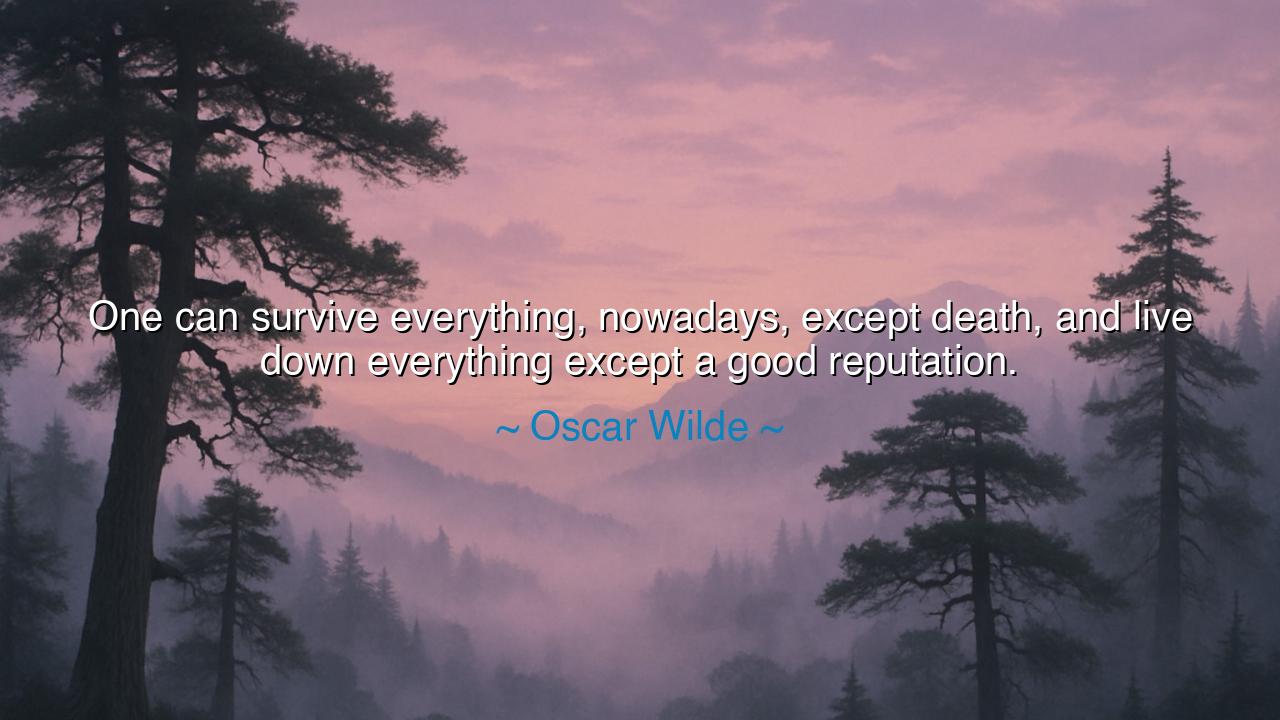
One can survive everything, nowadays, except death, and live down
One can survive everything, nowadays, except death, and live down everything except a good reputation.






In the councils of wit and warning, hear Oscar Wilde loose a barbed arrow: “One can survive everything, nowadays, except death, and live down everything except a good reputation.” The sentence moves by elegant inversion. First clause: all calamities can be outlasted—save death. Second clause: all disgraces may be lived down—save a good reputation. Wilde makes comedy do philosophy’s work. He reminds us that society forgives scandal with surprising haste, but it rarely releases a person from the costume it prefers. Applause can be a cage; praise, a mask that others fasten to our face.
The meaning is double. On one side, the maxim punctures moral panic: fashions, failures, even public shame often prove temporary; human beings return to the feast after storms. On the other side, the line warns of the tyranny of respectability. A good reputation—that cherished badge—can become a script enforced by friends and foes alike. Once you are filed under “upright,” your permitted range of motion narrows; you are drafted into the role of exemplar, where surprise is treated as betrayal. Wilde’s joke is tender and cruel at once: to be seen as good is lovely; to be required to be only that, unfree.
As to origin, the line is spoken by Lord Illingworth in Act I of Wilde’s 1893 play A Woman of No Importance. In the published text, he quips to Mrs. Allonby: “One can survive everything nowadays, except death, and live down anything except a good reputation.” She fires back: “Have you tried a good reputation?” to which he replies that he has been spared that “annoyance.” The exchange is the play’s moral semaphore: a brilliant rake mocking the very virtue the surrounding society publicly lauds. Wilde embeds the aphorism in dialogue so that its satire lands with character, not just cleverness.
Set the remark within Wilde’s broader mirror to the age. The 1890s glittered with nowadays improvements—telegraphs, newspapers, reputations built and razed overnight. Wilde shows how quickly public opinion rehabilitates a fallen favorite if the performance resumes, yet how stubbornly it imprisons the “respectable” within narrow expectations. Reputation becomes a currency that buys entrée—but also exacts control. The epigram, like many of Wilde’s, is a tuning fork for hypocrisy: it rings equally against prudery and against the theatrical pursuit of virtue as a brand.
A story makes the wisdom plain. Consider a celebrated headmistress in a small town, known for poise and rectitude—her good reputation a civic legend. When she opens a late-night reading room for factory workers and hosts debates that ruffle local powers, she is scolded not for any fault but for departing from the part she was assigned. Meanwhile, the town’s charming rogue, long forgiven, launches a new charity gala and is instantly embraced. The fallen are restored; the excellent are restrained. This is Wilde’s cruel joke: disgrace can be outlived; goodness, embalmed by expectation, is harder to escape.
History offers a sterner echo—even in Wilde’s own life. London society delighted in his glittering paradoxes and invited him everywhere—so long as he stayed a decorative genius. When his private truth shattered the performance demanded by respectability, reputation turned, and the same society that easily “lived down” others’ sins refused him the mercy it often extends to entertainers of lesser moral seriousness. Thus the epigram’s other edge: a culture that worships image can swiftly forgive scandal if it remains entertaining, and just as swiftly exile the one who challenges its flattering self-portrait.
What lesson, then, should we carry? First, hold reputations lightly—your own and others’. Treat them as weather, not law. Second, refuse to make anyone your symbol of virtue; let people be larger than the labels you give them. Third, prize integrity over image: do the next right thing even if it smudges your “brand.” Fourth, cultivate mercy’s memory: allow others to live down their failures by giving them room to grow—and allow yourself to grow beyond the roles that applause assigns. These are the arts that keep honor alive without turning it into a prison.
Finally, keep the cadence as a pocket rule: survive everything—except death; live down everything—except a good reputation. Let it humble your judgments and loosen your fear of public misstep. Let it warn you when compliments start to steer your soul. And when you must choose between the comfort of being thought good and the courage of actually doing good, remember Wilde’s needle: better a living truth than a polished mask. Then your life will be the kind that survives fashion’s gusts and serves what reputations are supposed to serve—the freedom to do what is right.






AAdministratorAdministrator
Welcome, honored guests. Please leave a comment, we will respond soon